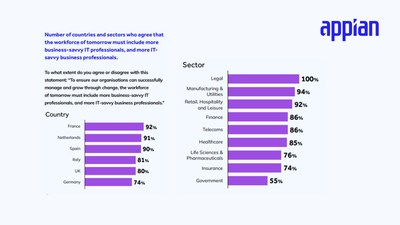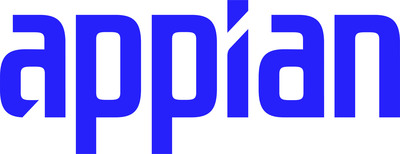80% believe tomorrow's workforce must have more business-savvy IT professionals and more IT-savvy business professionals to survive
LONDON, Nov. 16, 2022 /PRNewswire/ -- IT leaders feel they now have a seat at the table in terms of business decision-making but their ability to drive business agility could be short-lived, according to a new study from Appian (Nasdaq: APPN). Eight in ten (79%) UK developers say their organisation is already shifting focus away from innovation projects and towards cost-cutting initiatives, which could halt the momentum achieved in quickly rolling out new technologies and solutions during the Covid pandemic. This could have damaging implications for business growth and technological transformation at a time when agility and new ideas should be encouraged.

The new study, "From Boom to Bust: Why Empowering Developers is Vital for Business Innovation," surveyed 1,500 developers and software engineers across Europe (France, Italy, Germany, Netherlands, Spain, and the UK). It found three quarters (75%) of respondents in the UK are concerned that the transition from the pandemic to downturn will see business leaders freeze IT budgets and headcounts, increasing IT backlogs, and slowing enterprise digitisation and modernisation efforts.
This is in stark contrast to the progress made when the pandemic required fast action and new approaches to business innovation. More than four-fifths (85%) of respondents in the UK say the past two years have sharply accelerated their company's focus on IT-driven business transformation. Meanwhile, three-quarters (74%) say they now have a full seat at the table as a business decision-making partner. But firms that fail to leverage developers' increased influence are at risk of seeing diminishing returns.
When asked about the consequences of freezing IT budgets and headcount, the top four fall-outs mentioned by UK developers were: their organisation would become increasingly fragmented and siloed (44%); new platforms would take longer to integrate, reducing ROI (43%); the company would be more likely to struggle when attempting to capitalise on new growth opportunities (40%); and IT staff turnover would increase (40%).
The research also aimed to understand how European software developers and engineers feel about their organisations' ability to innovate in this market, and the impact they're able to have on business decision-making in the face of uncertainty.
Respondents in the UK identified adapting business strategy due to economic changes (44%), maintaining focus on core mission (36%), as well as harnessing new technologies and platforms (36%) as the top three critical growth drivers in the face of harsh economic conditions. When it comes to technology-led business decisions, insights show developers feel strongly about the need for improved collaboration and mutual understanding.
A third (36%) of UK developers say too many silos throughout the organisation prevent a full understanding of how to use IT. An additional four in ten (38%) say business counterparts believe it is quicker to go directly to IT vendors for solutions, rather than engage IT teams within the business. To overcome these challenges, eight in ten (80%) developers in the UK say the workforce of tomorrow must include more business-savvy IT professionals and more IT-savvy business professionals, if organisations want to be able to successfully manage and grow through change.
IT leaders also believe technology can help businesses to become more efficient at a time when they are looking to do more with less. Nearly half of respondents believe technologies like low-code development and artificial intelligence/machine learning can help address the resource and business engagement challenges facing IT (47% and 46%, respectively), while helping organisations adapt to change and get work done faster.
"Covid forced businesses to rapidly innovate their processes, increase automation, and absorb new technologies," said Michael Beckley, Founder, CTO, and CMO at Appian. "Organisations that continue to invest in IT-led innovation and agility will be better prepared to navigate the tight economic conditions expected in 2023."
Click on this link to read the white paper about the research findings on our website.
About Appian
Appian is the unified platform for change. We accelerate customers' businesses by discovering, designing, and automating their most important processes. The Appian Low-Code Platform combines the key capabilities needed to get work done faster, Process Mining + Workflow + Automation, in a unified low-code platform. Appian is open, enterprise-grade and trusted by industry leaders. For more information, visit www.appian.com.
Research Methodology
This research was commissioned by Appian and conducted by Censuswide with 1,510 software developers, app developers and software engineers across five countries: France (252), Germany (250), Italy (256), the Netherlands (252), Spain (250), and the UK (250). The survey was conducted in October 2022.
Censuswide employs members of the Market Research Society, belongs to the British Polling Council, and abides by the ESOMAR principles.
Note that the report uses Agree (net) values for certain questions, combining "Strongly Agree" and "Agree" responses.

Photo - https://mma.prnewswire.com/media/1948629/2022_11_16_Appian_Europe_IT_Survey.jpg
Logo - https://mma.prnewswire.com/media/1488235/Appian_Logo.jpg
![]() View original content:https://www.prnewswire.co.uk/news-releases/survey-report-it-leaders-identify-key-growth-drivers-in-transition-from-pandemic-to-recession-301679881.html
View original content:https://www.prnewswire.co.uk/news-releases/survey-report-it-leaders-identify-key-growth-drivers-in-transition-from-pandemic-to-recession-301679881.html

